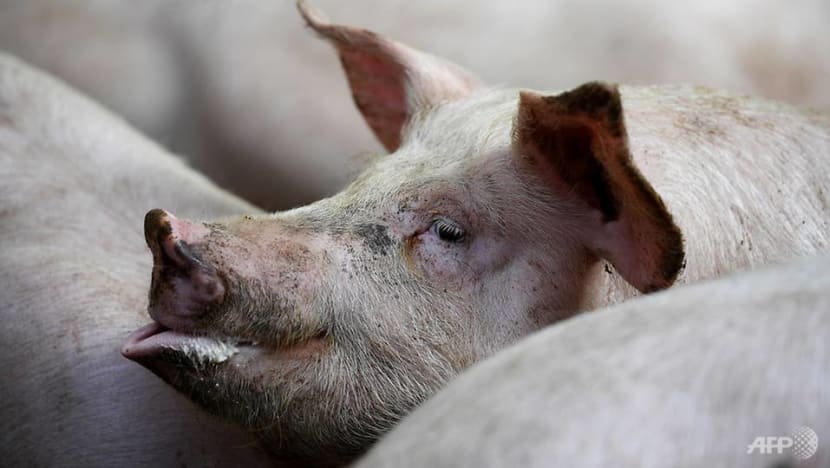Pig blood: Why and when was it banned in Singapore?

File photo of a hog. (Photo: AFP/Damien Meyer)
SINGAPORE: You might have eaten it in Taiwan’s night markets, as blood sausages in the United Kingdom or even remember having it here in your pig's organ soup as a child - but this is not food for the faint-hearted.
While animal blood is a fairly common ingredient in many cuisines around the world, it is banned for consumption in Singapore.
On Wednesday (May 19), the Singapore Food Agency (SFA) commenced investigations against a Thai restaurant at Golden Mile Tower for the illegal sale and possession for sale of animal blood curd.
During the operation, authorities found the restaurant selling a dish containing pig blood curd. They also seized unsold pre-packed pig blood.

“Animal blood food products, such as pig’s blood, are prohibited in Singapore as blood can easily support the growth of bacteria and harbour diseases,” wrote SFA in Wednesday’s press release.
“Unhygienic harvesting of blood can also result in the introduction of food borne pathogens into blood food products.”
The agency cautioned against illegally imported food, as they are of unknown source and can pose a food safety risk.
“In Singapore, food imports must meet SFA’s requirements. Food can only be imported by licensed importers, and every consignment must be declared and accompanied with a valid import permit,” the agency said.
After SFA's announcement on the seizure, many people recalled on social media having eaten pig blood before, with some wondering why and when it was banned locally.
THE NIPAH OUTBREAK
In response to CNA's queries, SFA said the then Agri-Food and Veterinary Authority (AVA) banned the collection of pig blood from Singapore's local abattoir during the Nipah virus outbreak in 1999.
This was because blood was a potential source and mode of transmission for viruses and other food-borne pathogens, the spokesperson said.
Since then, Singapore’s abattoir has not supplied pig blood and SFA has not accredited any sources of pig blood for import into the country, the spokesperson added.
The National Centre for Infectious Diseases (NCID) said on its website that the first human cases of the Nipah virus occurred between September 1998 and June 1999 in Malaysia and Singapore, with no new cases reported in either country since then.
According to Singapore Infopedia, which is run by the National Library Board (NLB), the outbreak in Singapore was initially thought to be the mosquito-borne Japanese encephalitis virus.
However, infections in Malaysia occurred among those who had close contact with swine.
Following which, the authorities took “immediate measures” to prevent the introduction of the virus to Singapore, including the suspension of live pig imports from affected farms in Malaysia, increasing the frequency of fogging and spraying larvicides to destroy mosquitoes.
All abattoir workers and pig traders in Singapore were also ordered to go for checkups.
Eleven people in Singapore were infected by the virus, with one death.
The Nipah virus causes inflammation in the brain and transmission occurs through direct contact with infected pigs, bats or people.
Under Singapore’s Wholesome Meat and Fish Act, anyone guilty of illegal importing and selling pig blood products could be fined up to S$50,000 or imprisoned for up to two years, or both.
On subsequent convictions, they may be fined up to S$100,000, imprisoned for up to three years, or both.














